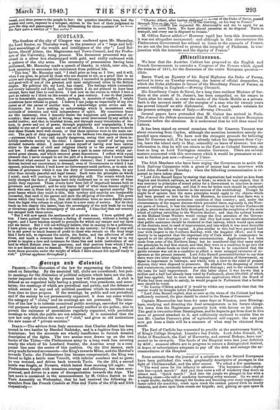SCOTLAND.
The freedom of the city of Glasgow was conferred upon Mr. Macaulay, the Lord Rector, on Thursday week, in the presence of a "large and bril- liant assemblage of the wealth and intelligence of the city "; Lord Bel- haven, Sheriff Alison, the Magistrates and Town-Council, and the Profes- sors of the University, being present. The document presented was en- closed in a silver box electrotyped with gold, and richly embossed with a pattern of the city arms. The ceremony of presentation having been performed, Mr. Macaulay made a speech of thanks, in which, inter cilia, he took occasion to announce his retirement from political life.
" This box," Mr. Macaulay said, "I shall prize as long as I live; and it will, when I am gone, be prized by those who are dearest to me, as a proof that in an active and chequered life, political and literary, I succeeded in gaining the esteem and good-will of one of the greatest and most enlightened cities in the British empire. My political life, my Lord, has closed. The feelings which contention and rivalry naturally call forth, and from which I do not pretend to have been exempt, have had time to cool down. I look now on the events in which I bore a part as calmly as I think on the events of a past century. I can do that justice now to honourable opponents, which, perhaps, in moments of conflict, I might sometimes have refused to grant. I believe I can judge as impartially of my own career as of the career of another man. I acknowledge great errors and de- ficiencies; but I have nothing to acknowledge which is inconsistent with rectitude of intention and with independence of spirit. My conscience bears me this testimony, that I honestly desire the happiness and greatness of my country; that my course, right or wrong, was never determined by any selfish or sordid motive; and that in troubled times, and through many vicissitudes of for- tune in power and out of power, through popularity and unpopularity, I was faithful to one set of opinions and to one set of friends. I see no reason to doubt that these friends were well chosen, or that these opinions were in the main cor- rect. The path of duty appeared to me to lie between two dangerous extremes —extremes which I may call equally dangerous, seeing that each of them in- fallibly conducts society to the other. I cannot accuse myself of having ever deviated towards either. I cannot accuse myself of having ever been untrue either to the cause of civil and religious liberty or to the cause of property and law. I reflect with pleasure that I bore a part in some reforms which cor- rected great abuses, and which removed great discontents. I reflect with equal pleasure that I never stooped to act the part of a demagogue; that I never feared to confront what seemed to me unreasonable clamour; that I never in times of distress incited my countrymen to demand, even of Governments to which I was opposed, miracles which I well knew no Government could perform, or to seek the redress of grievances which it was the duty of Government to redress, by any other than strictly peaceful and legal means. Such were the principles on which I acted; such will continue to be my principles still. The events which have lately changed the face of Europe have only confirmed me in my views of what public duty required. These events have been full of important lessons both to governors and governed; and he only learns half of what these lessons ought to teach who sees in them only a warning against tyranny, or against anarchy. The great lesson which they teach is this, that tyranny and anarchy are inseparably connected, that each is the parent and each the offspring of the other. The great lesson which they teach is this, that old institutions have no more deadly enemy than the bigot who refuses to adjust them to anew state of society. Nor do they teach us less clearly this lesson, that the sovereignty of the mob leads by no long or circuitous path to the Sovereignty of the sword. I bless God that our country has escaped both these errors. " But I will now speak the sentiments of a private man. I have quitted poli- tics. I have quitted them without a feeling of resentment, without a feeling of regret; and I have betaken myself to pursuits for which my temper and my taste suit me better. But I will not willingly believe, that in ceasing to be a politician, I have given up the power to render service to my country: for! hope it may still be in my power to teach lessons of profit to those who remain on the busy stage that I have left, to represent the merits, the faults, and the affections of other times, and teach a common lesson of charity to all. I hope it may be in my power to inspire a love and reverence for those free and noble institutions of our land to which Britain owes her greatness, and that position from which I hope she is not destined soon to descend. With your approbation before me, I will re- sume those pursuits under the weight of which I have almost felt myself ready to sink." (Great applause throughout.)


























 Previous page
Previous page